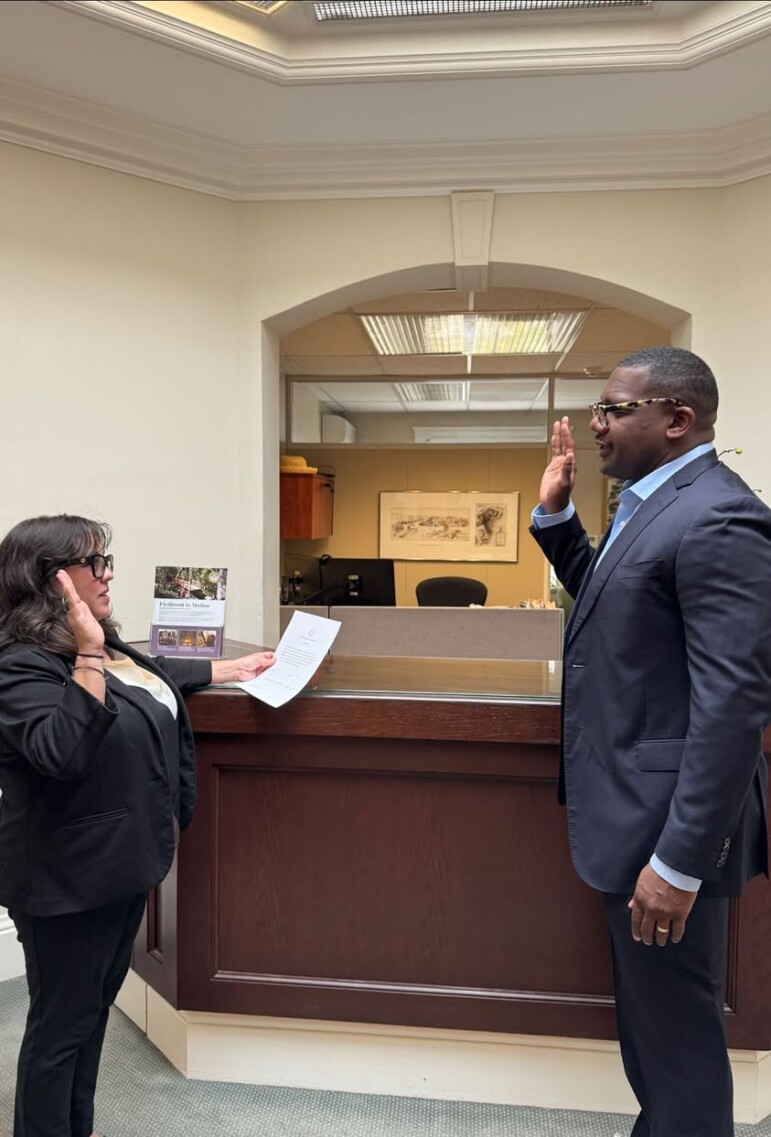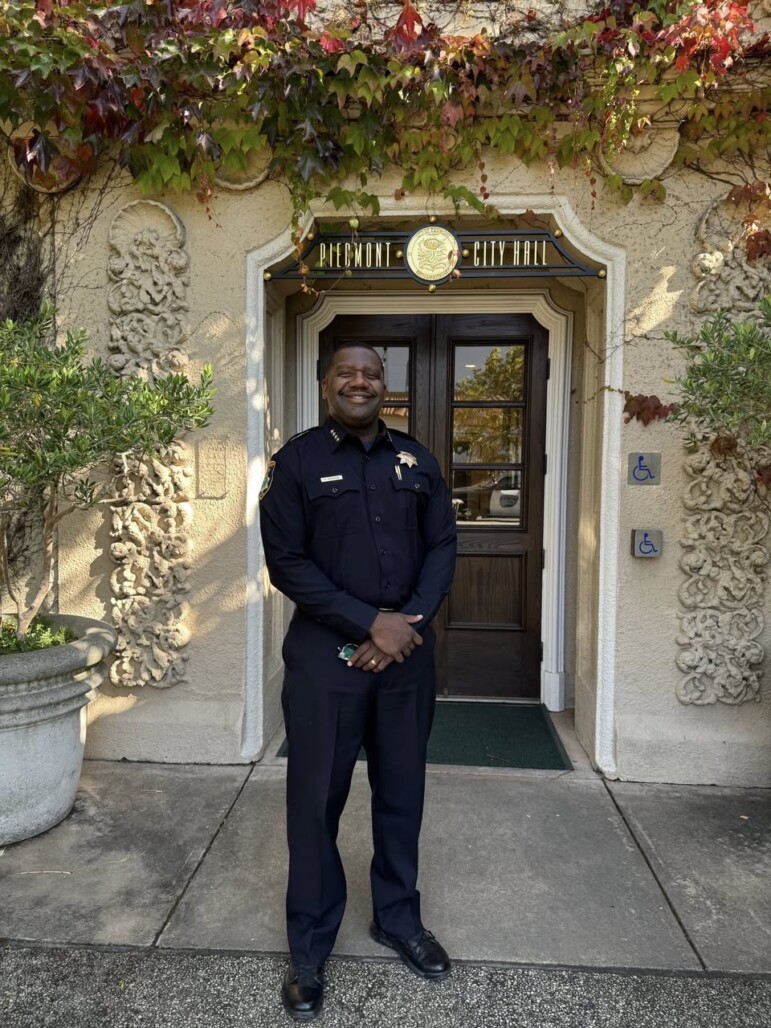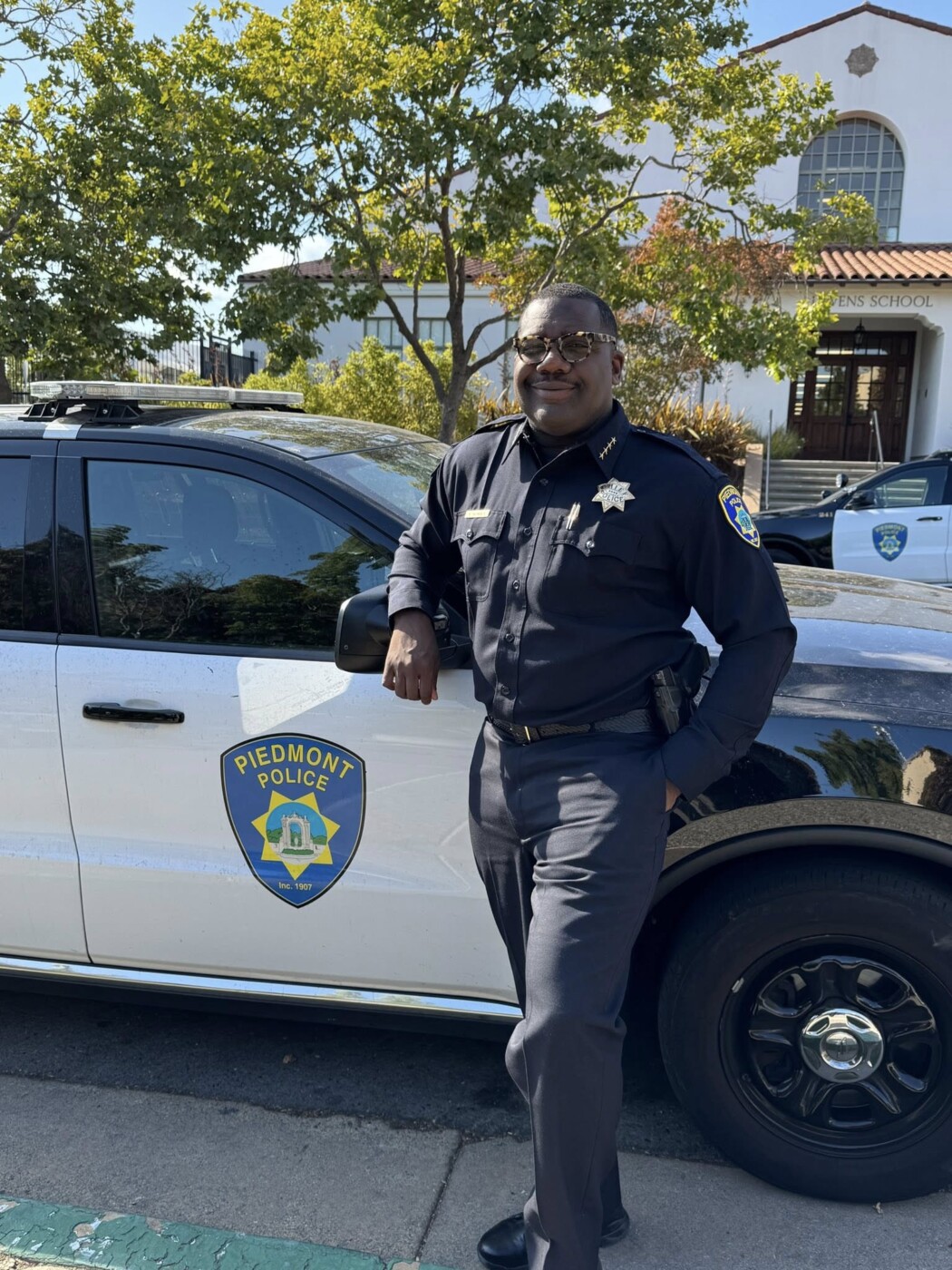Shavies moves to Piedmont from Oakland
A little over a year ago, Frederick Shavies said he realized that the clock was ticking on his tenure with the Oakland Police Department.
Shavies had just turned 44 and had been with the Department for 18 years. He had been promoted to lieutenant in 2017 and had a distinguished record working everything from the beat in the neighborhood in East Oakland that he grew up in to working with Ceasefire, the anti-gang unit that helped reduce homicides throughout the city.
However, now he was being asked to move up to deputy chief in charge of the bureau of investigations. Throughout his tenure in Oakland, no chief had lasted more than a couple of years.
“That means that the chief will be fired soon and you will be then the assistant chief or tapped to be the interim chief and … my clock has started,” Shavies said.
He had met then-Chief Jeremy Bowers and Captain Chris Monahan from the Piedmont Police Department back in 2018 at a joint training. And when Bowers announced his retirement this past March, Shavies decided to apply for the position. On July 7, he was named to succeed Bowers.
Now 45, Shavies is a couple of weeks into the job. He has a plan for his new position, he said, but also wants to get to know his new community, both the residents and the veterans in the Piedmont Police Department.

New PPD chief Shavies is sworn in 
PPD Chief Frederick Shavies
“I do have a plan,” Shavies said. “But I think one of the things I want to do the first couple of weeks is still look, listen and learn. I think about the adage of an individual buys some property, there’s a fence in the middle of the this property and he says, ‘I might want to take this fence down.’ And somebody asks, ‘Do you know why the fence was put up?’”
There are several obvious differences between Piedmont and Oakland from a law enforcement perspective. The nature of crime is one thing and the size of the department is another. However, the Bay Area is really one big beat, as it were, and crimes happening in the bigger cities don’t happen in isolation from the smaller communities.
Shavies has seen it all. He grew up in Oakland and played football and basketball at Fremont High School. He loved basketball but was a college prospect as defensive end in football. He was one of the top 10 area recruits in the 1998 Contra Costa Times Cream of the Crop and accepted a scholarship to Washington State University.
There, he helped lead the Cougars to the Sun Bowl as a junior and then the Rose Bowl his senior year. He said one of his best college football memories was stripping current UCLA coach and then a standout running back DeShaun Foster. Al Genatone returned the ball for a touchdown in a 20-14 Washington State victory. Lamont Thompson of El Cerrito, an old friend of Shavies’s, had four interceptions in the same game for the Cougars.
Washington State also played at Ohio State.
“We played Ohio State in the Big House my senior year the year they won the national championship,” Shavies said. “I was talking some smack to Lee Corso because we had a lead at halftime.”
The Cougars led 7-6 at that point but went on to lose, 25-7.
Originally, Shavies wanted to study education on the Palouse because he knew he wanted to work with kids like the ones he grew up with. He graduated with a degree in Sociology and stayed in Pullman as an assistant coach under Bill Doba, who had replaced Mike Price after Shavies’s senior season.
Shavies said he was back in Oakland on a trip watching Leon Powe play basketball when some of the police officers at the game suggested he should join the force. Later, Shavies told Doba he was thinking of joining the OPD.
“That’s the dumbest thing I ever heard in my life,” Doba said.
Shavies said one of the reasons he decided to leave coaching was how dependent assistants were on the fate of a head coach. A head coach could be fired, leaving the staff scrambling for new jobs. A head coach could get a new job and not take the whole staff with him. The job stability is low and the pay for most assistants isn’t much.
“I didn’t know that was a life that I wanted,” Shavies said.
So he returned to Oakland and moved back in with his mother. His father had passed when he was in high school.
Shavies worked as a GED prep instructor and taught literacy at a local shelter, entered the Oakland Police Academy and joined the force in 2006. He spent his first year working Beat 30, which included the street his mother lived on.
“If I could start over as a cop I would do Beat 30,” Shavies said. “I had lived there the majority of my life.”
He worked overtime with the gang unit and moved full time into the task force after about a year. He was promoted to sergeant in 2012.
In January 2013, the Violent Crime Unit was created, later called Ceasefire. Shavies was told he could pick any seven police officers for the unit. One of the first cases the team investigated was the murder of a kid on the street Shavies had grown up on. The group also involved members of the community in an effort to reduce the violence.
Shavies said the murder count dropped from 131 murders in 2012 to 69 a few years later.
“Sixty-nine is far too many,” he said. “But we cut it in half.”
Shavies is quick to point out that crime rates can be affected by all sorts of factors beyond policing.
“I’m extremely grateful that we were credited with the reduction in crime,” he said. “Also, I’m smart enough to know there was a confluence of factors that went into the reduction in crime.
“The city was changing. There was just so much that went into it. It sounds good to say you guys did this. Thank you. But I’m also smart enough to know that 12-18 cops can’t do that alone. One hundred cops can’t do that alone.”
Shavies said it’s important to fight discrimination and excessive force in police departments. He also understands the nuances of the issues.
“I’ve been a Black person in America for 45 years,” he said. “It’s definitely a unique descriptor. It also has given me unique insight. Being Black in America, being at some point young, being Black in policing. Its unique. I’ve seen some things.”
Shavies has been married for 10 years. His wife Chinere is a real estate agent. Their daughters Channing (12) and Chayce (10) were already enrolled in Piedmont schools. Channing loves basketball, something her father loves as well. He counts California head coach Charmin Smith among his friends.
He loves to travel and used to be into photography. Now, basketball is taking over his life. He is a season ticket holder for the Golden State Valkyries and the Cal women.
